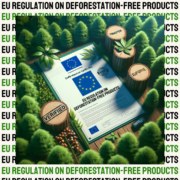The enforcement of new EU regulations against deforestation may have a significant impact on Vietnam’s agricultural exports to Europe. Nonetheless, there are positive aspects to consider when examining the potential consequences.
What is it about ?
Under the new regulations, companies exporting goods to the EU are required to provide a due diligence statement and verifiable assurances that their products do not come from deforested land after December 31, 2020. Plus, Companies must also verify compliance with relevant legislation in the country where the goods are produced.
Even if a company’s manufacturing process meets international quality standards, it will still be evaluated based on the origin of its raw materials. This necessitates investments in implementing advanced technological measures.
Risk for companies
In order to ensure compliance with this new regulation, checks will be carried out by the competent administrative authorities of the Member States of the European Union. Failure to comply with this regulation will have the following immediate consequences for traders/operators:
- correct the formal non-compliance ;
- prevent the product in question from being placed or made available on the market or exported ;
- immediate withdrawal or recall of the product in question.
On the other hand, there may also be sanctions:
- fines proportionate to the environmental damage and the value of the basic products in question or of the products in question concerned ;
- confiscation of the products in question from the operator and/or trader ;
- confiscation of any income derived by the operator and/or trader from a transaction relating to the products in question concerned;
- temporary ban on placing or making available on the market or exporting the basic products in question and the products in question in the event of a serious infringement or repeated infringements.
How to comply ?
In order for products to be exported to the European market, they must meet the following three conditions:
- they must be “zero deforestation”;
- they must be produced in accordance with the relevant legislation of the country of production;
- and they must be subject to a declaration of due diligence.
The “zero deforestation” criterion means that the products in question must have been produced on land that has not been subject to deforestation activities after 31 December 2020, or have been fed with or manufactured from such products. Then, the laws of the country of production are also applicable.
The obligation to declare due diligence consists of three stages described in articles 9, 10 and 11 of the regulation.
Stage 1 – Information Collection (Article 9)
When conducting Due Diligence (DD), it is essential for operators or traders to gather information, documents, and data confirming that the commodities or products in question do not contribute to deforestation and that the producers in third countries comply with their local regulations. This process involves several key steps:
- Identifying the country of origin for the commodities.
- Pinpointing the precise geolocations of the land plots where the commodities were sourced.
- Recording the production date and time of these commodities.
- Obtaining the contact details of the producers.
Stage 2 – Risk Assessment (Article 10)
After gathering this information, a thorough risk assessment must be performed to determine if the commodities or products are indeed free from deforestation implications. Operators are prohibited from marketing commodities or products that pose a substantial risk of deforestation. Additionally, operators and traders must maintain detailed records of these evaluations.
Stage 3 – Risk Mitigation (Article 11)
If a company is unable to confirm that its products carry no risk or only a negligible risk of non-compliance, it must implement risk mitigation measures. These measures could involve requesting further information, data, or documentation, conducting independent surveys or audits, or other relevant actions. Additionally, the company should provide its suppliers with assistance in meeting compliance standards. It is mandatory for companies to establish robust systems capable of effectively managing these risks, including subjecting these systems to independent audits. However, Small and Medium-sized Enterprises (SMEs) are exempt from this audit requirement.
Solutions for companies
In order to prepare for this EU regulation, there are a number of steps firms can take to prepare for the new EU regulations to limit deforestation. First of all, firms should ensure they have a clear understanding of the regulations, regulated product lists, and the implementation timelines of the legislation in order to respond proactively.
Then, businesses need to have a tracking system in place to ensure that agricultural products produced in their supply chains are not linked to deforestation or ecosystem degradation.
Key dates:
The implementation dates of the obligations for businesses are as follows:
– 18 months after the text comes into force for operators and retailers, i.e. 30 December 2024 ;
– 24 months after the text comes into force for VSES/SMES businesses, i.e. 30 June 2025.
*Targeted goods by the New EU Regulation combating deforestation: soy, beef, palm oil, wood, cocoa, coffee, rubber, and charcoal, as well as derivatives such as leather, chocolate, and furniture (this list can be updated over the time).
Author: Camille
Editor: Annie
Check out our Knowledge Hub for more Sustainable Finance content
Sources
Regulation (EU) 2023/1115 of the European Parliament and of the Council of 31 May 2023 on the making available on the Union market and the export from the Union of certain commodities and products associated with deforestation and forest degradation and repealing Regulation (EU) No 995/2010
Voluntary Partnership Agreement Between The European Union And The Socialist Republic Of Viet Nam On Forest Law Enforcement, Governance And Trade, 05/06/2019 (Voluntary partnership agreements on timber legality)
FAQ – EU deforestation Regulation
European Commission, “EU rules to guarantee that the products EU citizens consume do not contribute to deforestation or forest degradation worldwide”,
Binh Truong, “EU Regulations to Combat Deforestation and Impact on Vietnam”, doctrine, 15/05/2023
The EU Deforestation Regulation Analysis – March 2023 – Duncan Brack








